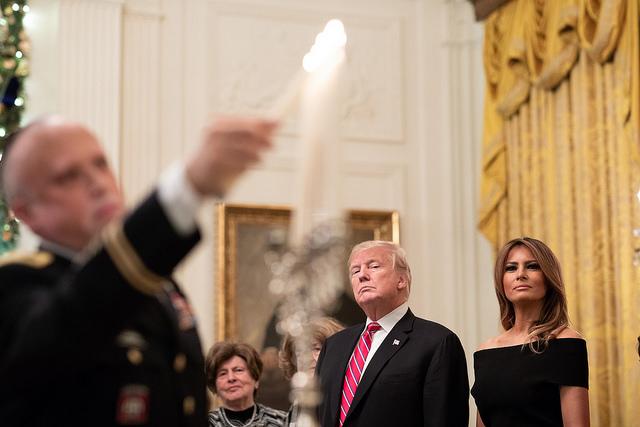
US President Donald Trump may be mercurial, but he does have a doctrine. As his speech in September at the United Nations General Assembly again confirmed, Trump rejects multilateral institutions and liberal values in favour of the nation-state and power politics. But understanding the ‘Trump doctrine’—with its support for abandoning America’s longstanding role as a global arbiter—does not make it any less disruptive, especially for the already unstable Middle East.
It is no surprise that the Middle East has been particularly vulnerable to the unsettling effects of the Trump doctrine. After all, the timid policies of Trump’s immediate predecessor, Barack Obama, significantly exacerbated the region’s dysfunction, opening the way for Trump to introduce what can only be described as mayhem.
For starters, the Obama administration utterly failed to make progress in resolving the Israeli–Palestinian conflict—a failure Trump promised to correct with the ‘deal of the century’. Instead, Trump has unilaterally recognised Jerusalem as the capital of Israel, moving the US embassy there, and ended financial support to the United Nations Relief and Works Agency, which supports more than five million registered Palestinian refugees. One must be extraordinarily ignorant to believe Trump’s claims that these actions amount to taking two of the thorniest issues in the Israeli–Palestinian conflict ‘off the table’.
Making matters worse, by abandoning efforts to overthrow Syrian dictator Bashar al-Assad, the Obama administration opened the door for Russia to move into the region. Under Trump, in a sinister reversal of America’s Cold War victory, the Middle East has become Russia’s playground.
Egypt, a close US ally, has signed huge arms deals with Russia, which is also providing four nuclear-power reactors to the country. The bilateral relationship has been deepened through close military cooperation in Libya—a country that, totally ignored by the United States, has become a vital strategic link in Russia’s penetration of the Western sphere of influence, exemplified by the Kremlin’s efforts to build a naval base there.
Saudi Arabia, which has long benefited from America’s security umbrella, has also purchased nuclear-power reactors and advanced S-400 missiles from Russia. And Bahrain, Morocco and the United Arab Emirates are pursuing arms deals with Russia.
Turkey, a key NATO ally, is also moving into Russia’s strategic orbit. When it comes to his country’s faltering economy and democratic backsliding, President Recep Tayyip Erdoğan has much to answer for. But the Trump administration’s decision in August to double US tariffs on steel and aluminium as punishment for Turkey’s refusal to release an American cleric arrested for alleged ‘subversive activities’ undoubtedly contributed to the lira’s collapse. In fact, the Trump administration has offered no indication that it cares whether Turkey remains a US ally at all.
Even Israel, which Trump has done so much to appease, is drifting towards Russia, on which it depends to help it prevent Iran from gaining a foothold in Syria. With the Trump administration offering nothing resembling an effective Syria policy, much less a strategy for reining in Iran’s drive to secure a land corridor to Lebanon, Israeli Prime Minister Benjamin Netanyahu now makes regular pilgrimages to Moscow to plead Israel’s case.
The dangers raised by Trump’s policies towards Iran cannot be overstated. Withdrawing the US from the Joint Comprehensive Plan of Action (JCPOA), the most important nuclear non-proliferation agreement in a quarter-century, and imposing a strict sanctions regime on Iran have failed to derail the latter’s bellicose strategy for achieving regional primacy, exemplified by its activities in Lebanon, Syria and Yemen. These policies have also undermined America’s own global standing, including by widening the rift between the US and its European allies, all of which support the JCPOA.
Now, Syria is at risk of becoming the site of a major war between Israel, which is already conducting military drills, and the alliance of Iran and its Lebanese proxy, Hezbollah. Such a war, if it comes, could also engulf Lebanon. In all the turmoil, Israel could even end up clashing with Russia.
Consider the recent downing of a Russian military plane by Syrian anti-aircraft fire. Because the accident—which killed all 15 people aboard the plane—occurred amid an Israeli attack on Iranian installations, Russia’s military, already fed up with the Israeli air force’s supposed impudence, blamed Israeli jets for putting the Russian plane in the line of fire. Now, Russian President Vladimir Putin appears to be planning to send missiles to Syria to help counteract the Israeli air force’s dominance of that country’s air space.
But Syria is far from the only country that is in danger. Trump’s policy of emboldening Iran’s rivals—Egypt, Israel and Saudi Arabia—could also trigger escalations in the conflicts in Bahrain, Lebanon and Yemen, not to mention Gaza.
Instead of promoting a diplomatic settlement to end the colossal humanitarian tragedy in Yemen, Trump is providing Saudi Arabia’s Crown Prince Mohammed bin Salman with all the weapons he needs to prosecute a war that his country seems incapable of winning. That is on top of Trump’s abandonment of Obama’s calls for democratic reform—a gift to both the House of Saud and Egypt’s President Abdel Fattah el-Sisi.
Under Trump, the US has established itself as a deeply disruptive force not just in the Middle East, but throughout the world. Instead of resolving conflicts, Trump’s administration exacerbates them, in the illusory belief that supporting autocrats and punishing adversaries with sanctions, tariffs and the withdrawal of aid will facilitate negotiations later.
But, as the Arab Spring showed, there is a limit to the capacity of the Middle East’s autocracies to stifle the ambitions and frustrations of its burgeoning young population. When that capacity is depleted and the region is plunged into chaos, the Trump doctrine will have nothing to offer, because, in a sense, it will have achieved its goal.